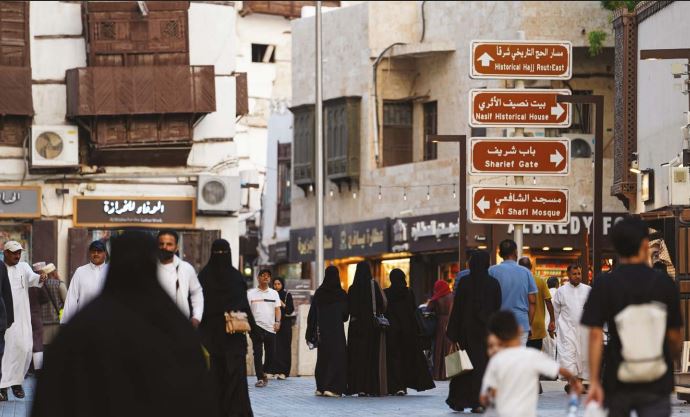
 Daily life in the port city of Jeddah, Saudi Arabia./SCREENGRAB
Daily life in the port city of Jeddah, Saudi Arabia./SCREENGRABWhen 22-year-old Mary* left her rural home in Kenya for Saudi Arabia, she dreamed of a better life.
What she found instead was a daily struggle for survival, isolation, and silence.
Mary’s story is one of many detailed in a new report titled “Locked In, Left Out-The hidden lives of Kenyan domestic workers in Saudi Arabia.
The report sheds light on the plight of Kenyan migrant workers in Gulf countries.
According to the report, most of these workers are women, often under 30, who take up domestic work under the promise of employment and income.
The report
This article is based on testimonies collected in the report Locked In, Left Out: Kenyan Migrant Domestic Workers in the Gulf, published by the Global Alliance Against Traffic in Women (GAATW) and the Kenya-based NGO Haki Africa.
The accounts shared reflect the personal experiences of the workers interviewed.
We acknowledge that not all domestic workers in the Gulf experience abuse and that conditions may vary widely based on employer, agency, and local enforcement.
Saudi Arabian authorities have, in recent years, introduced various reforms aimed at improving labor protections for migrant workers, including amendments to the kafala system. However, critics argue that implementation and enforcement remain inconsistent.
Attempts were made to reach the Saudi Ministry of Human Resources and Social Development for comment, but no official response had been received by the time of publication.
This article does not imply that all employers or officials in the Gulf region condone or engage in abusive practices.
Back to Mary and Jasmine's story
But once they arrive, many find themselves trapped under the kafala system, which binds them legally to their employers and strips them of basic freedoms.
“I didn’t leave the house for the entire year I worked there,” said one domestic worker quoted in the report. “Not even to get groceries. I wasn’t allowed to talk to anyone.”
The report reveals that isolation is a common tactic used to control workers. Without access to a mobile phone or even knowledge of the local language, women are unable to communicate distress or seek help.
Wages, too, are a problem. Some workers go months without pay. Others are underpaid or not paid at all.
“I worked from 4 a.m. to midnight every day, and I only got paid for the first three months,” one respondent shared.
This economic exploitation is exacerbated by psychological and physical abuse. Several women reported verbal threats, beatings, and even sexual harassment.
Despite these grim realities, most of the workers felt they had no choice but to endure it.
Returning home often meant facing the same poverty that forced them abroad in the first place, only now with debt and trauma.
“I couldn’t tell my family what was really happening,” said another woman. “They were counting on me.”
*Name changed to protect identity.
‘I Sleep in Shifts, Just to Breathe’: Life in the Shadows
When Sarah* left Kiambu for Saudi Arabia, she clutched two things: a small bag and a big dream. The promise was simple — decent pay, dignified work, and a better life for her three children back home.
But nothing prepared her for the life that awaited behind the gates of her employer’s villa.
"I was told I'd work eight hours a day," Sarah recalls. "But from the moment I arrived, I barely slept."
Like many Kenyan domestic workers in the Gulf, Sarah found herself in a state of modern-day servitude — long working hours, physical and verbal abuse, delayed or denied pay, and no control over her movement or communication.
A new report by the Kenya Human Rights Commission and Solidarity Center lays bare the realities faced by many women like her.
Based on in-depth interviews with returnees, it details the risks, abuses, and — critically — the coping strategies migrant workers use to survive.
Sarah developed a system to cope. “I would divide the night into shifts,” she says. “Two hours sitting, two hours lying down — that way, I didn’t get caught sleeping too long.” Her biggest fear? “Being caught with my phone. That’s how they control you. Without your phone, you’re alone.”
For many women, their mobile phones become lifelines.
Through WhatsApp, Facebook, and TikTok, they share their location, vent frustrations, and even signal distress. Some create secret accounts to avoid detection. Others, like Sarah, delete apps after every use.
“I joined a Facebook group where other Kenyans post tips — how to record your employer secretly, how to keep money safe,” she says.
Financial abuse is a recurring theme in the report. Delayed or unpaid wages are common, and many women are forced to work overtime with no compensation. Employers withhold passports, cutting off any chance of escape.
Despite the risks, Sarah chose to endure — for her family. She kept a daily journal of her tasks and treatment. “It was my way of staying sane. Of reminding myself that I was still human.”
She returned home two years later, thinner and quieter, but determined. “I saved enough to start a salon,” she says. “But I will never go back.”
Her story mirrors those of thousands of Kenyan women who migrate to the Gulf under harsh conditions.
The report urges the government to take urgent steps to strengthen protections for migrant workers — from better pre-departure training to stronger bilateral agreements and accessible complaint mechanisms abroad.
It also urges the Kenyan government to take a more active role in protecting its citizens overseas.











